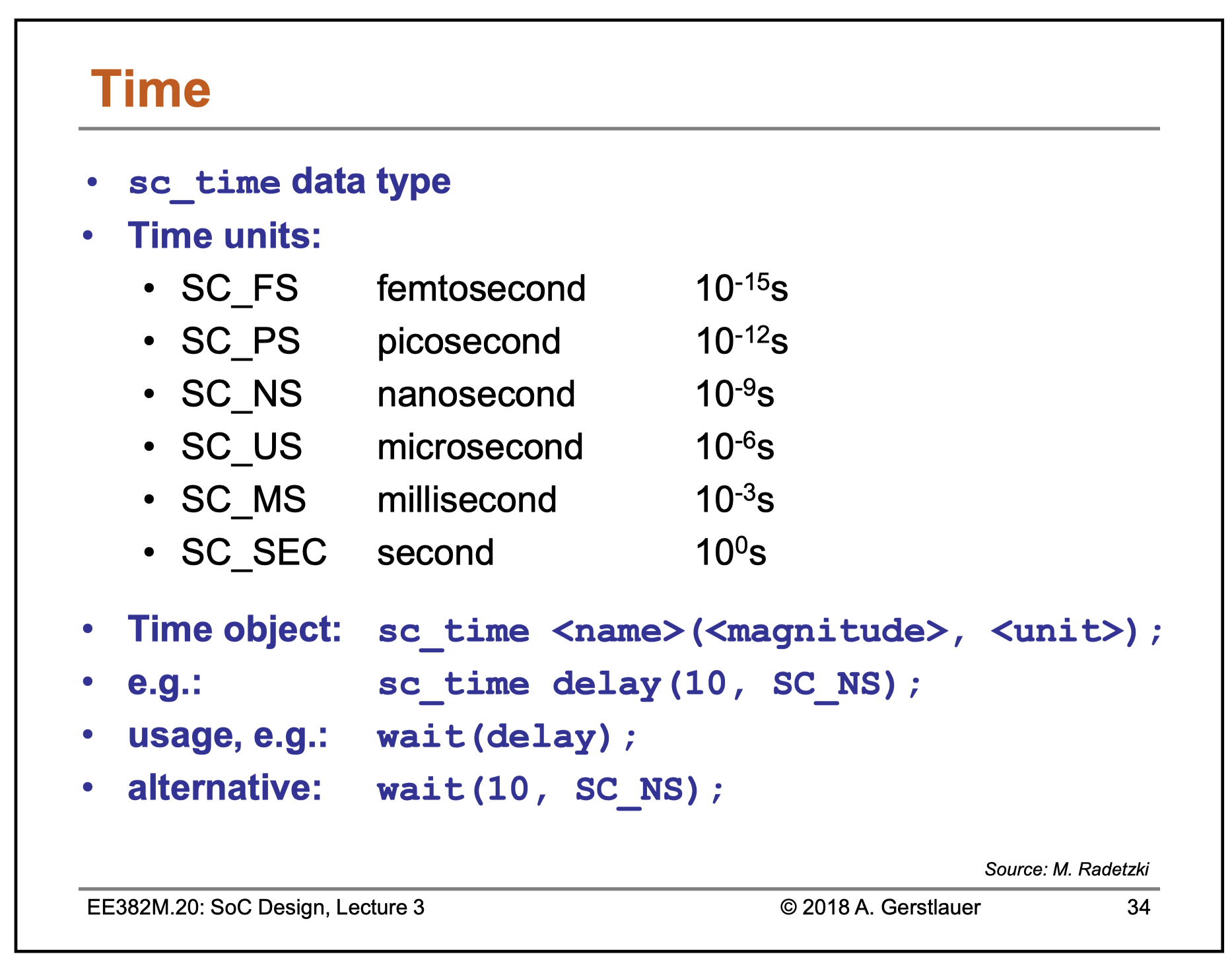SystemC 07 Time Notation

Simulated Time
Let’s first understand the difference of the two time measurements:
-
wall-clock time
- the time from the start of execution to completion, including time waiting on other system activities and applications
-
simulated time
- the time being modeled by the simulation, which may be less than or greater than the simulation’s wall-clock time.
-
sc_start(7261, SC_SEC);- Run simulation for 7261 second
sc_time
In systemC, sc_time is the data type used by simulation kernel to track simulated time. It defines several time units:
-
SC_SEC,SC_MS,SC_US,SC_NS,SC_PS,SC_FS. - Each subsequent time unit is 1/1000 of its predecessor.
sc_time objects may be used as operands for assignment, arithmetic, and comparison operations:
- multiplication allows one of its operands to be a double
- division allows the divisor to be a double
SC_ZERO_TIME
a macro representing a time value of zero. It is good practice to use this constant whenever writing a time value of zero, for example, when creating a delta notification or a delta time-out.
sc_time_stamp()
To get current simulated time, use sc_time_stamp().
Code
1
2
3
4
5
6
7
8
9
10
11
12
13
14
15
16
17
18
19
20
21
22
23
24
25
26
27
28
29
30
31
32
33
// Learn with Examples, 2020, MIT license
#include <systemc>
using namespace sc_core;
int sc_main(int, char*[]) {
sc_core::sc_report_handler::set_actions( "/IEEE_Std_1666/deprecated",
sc_core::SC_DO_NOTHING );
// suppress warning due to set_time_resolution
sc_set_time_resolution(1, SC_FS); // deprecated function but still useful, default is 1 PS
sc_set_default_time_unit(1, SC_SEC); // change time unit to 1 second
std::cout << "1 SEC = " << sc_time(1, SC_SEC).to_default_time_units() << " SEC"<< std::endl;
std::cout << "1 MS = " << sc_time(1, SC_MS).to_default_time_units() << " SEC"<< std::endl;
std::cout << "1 US = " << sc_time(1, SC_US).to_default_time_units() << " SEC"<< std::endl;
std::cout << "1 NS = " << sc_time(1, SC_NS).to_default_time_units() << " SEC"<< std::endl;
std::cout << "1 PS = " << sc_time(1, SC_PS).to_default_time_units() << " SEC"<< std::endl;
std::cout << "1 FS = " << sc_time(1, SC_FS).to_default_time_units() << " SEC"<< std::endl;
sc_start(7261, SC_SEC); // run simulation for 7261 second
double t = sc_time_stamp().to_seconds(); // get time in second
std::cout << int(t) / 3600 << " hours, " << (int(t) % 3600) / 60 << " minutes, " << (int(t) % 60) << "seconds" << std::endl;
return 0;
}
// Result
1 SEC = 1 SEC
1 MS = 0.001 SEC
1 US = 1e-06 SEC
1 NS = 1e-09 SEC
1 PS = 1e-12 SEC
1 FS = 1e-15 SEC
// 7261 seconds
2 hours, 1 minutes, 1seconds